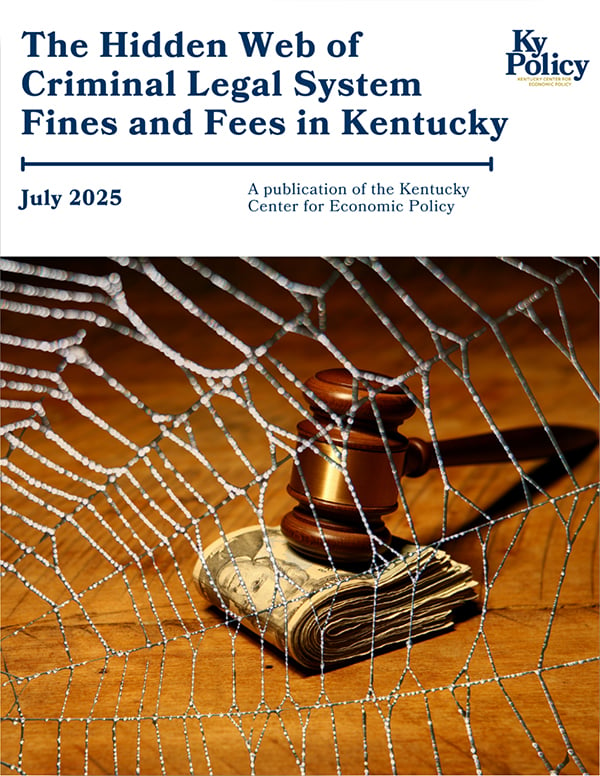Kentuckians who come in contact with the state’s criminal legal system are forced to navigate a hidden web of fines and fees that impose onerous and arbitrary costs at nearly every turn, a new report from the Kentucky Center for Economic Policy (KyPolicy) finds.
The report titled “The Hidden Web of Criminal Legal System Fines and Fees in Kentucky” includes a first-of-its-kind statute review that reveals more than 1,000 provisions in Kentucky state law that impose criminal legal system fines and fees. Because so many cannot afford them, those provisions have resulted in Kentuckians owing at least $91 million in outstanding fines and fees debt as of 2019.

The vast web of legal financial obligations remains hidden, however, because there is no comprehensive, centralized source of information about them. This vacuum of data is particularly concerning as lawmakers increasingly turn to fines and fees in a misguided attempt to appear “tough on crime” and to fill financial holes created by tax cuts.
“The report sheds much-needed light on criminal legal system fines and fees as a critical policy issue in need of reform in Kentucky,” said Ashley Spalding, KyPolicy research director and report co-author. “A large and growing body of research shows that these fines and fees don’t deter crime and are a small and unreliable source of revenue that is also costly to collect. Yet they are ubiquitous at every stage of the criminal system and have devastating, long-lasting consequences for people who can’t afford to pay them.”
To expand understanding of the fines and fees problem in Kentucky, KyPolicy researchers conducted a review of Kentucky’s statutes to identify all criminal system fees and fines where incarceration is a possible punishment. Fine-only traffic offenses were also included because so many people are impacted by these fines and their associated court costs. The review identified over 1,000 provisions, scattered throughout hundreds of chapters, that impose such a criminal fine or fee.
“Our work took months to complete but even still is just the tip of the iceberg because it does not include civil or locally imposed fines and fees, restitution or asset forfeiture, all of which create additional burdens on top of those discussed in the report,” said Pam Thomas, KyPolicy Senior Fellow and report co-author. Thomas led the statue review with the help of Scott West, the recently retired Deputy Public Advocate of Kentucky and a KyPolicy consultant.
In addition to the statute review, the report provides new, foundational insight into onerous incarceration fees imposed across the commonwealth. To collect this information, the researchers submitted open records requests to each of Kentucky’s 74 full-service jails seeking details on fees imposed on those incarcerated in their facilities; fifty-seven of them responded. Additionally, open records requests were submitted to the Department of Corrections and the Finance and Administration Cabinet for information about fees imposed in state prisons. The responses revealed a whole host of incarceration fees that vary widely among the different jails, and between jails and prisons.
“The data we collected illustrates how incredibly burdensome these fees are for Kentuckians behind bars and for their loved ones,” said Patience Martin, KyPolicy State Policy Fellow and a report co-author. “These costs are especially strenuous considering incarcerated workers in Kentucky earn pennies for their labor, and struggle to pay mounting institutional debts while also paying for health care services and overpriced necessities in these facilities.”
The report concludes with policy recommendations, including:
• Requiring fines and fees data collection, reporting and transparency
• Establishing a uniform ability-to-pay determination
• Eliminating the use of jail time for unpaid court debt
• Enacting a statute of limitations for the collection of criminal legal system fines and fees
“The legislative session presents an opportunity to begin reforming criminal legal system fines and fees in Kentucky before more lives are harmed,” Spalding said. “Lawmakers should seize it.”
The full report is available online at kypolicy.org.
Kentucky Center for Economic Policy

















